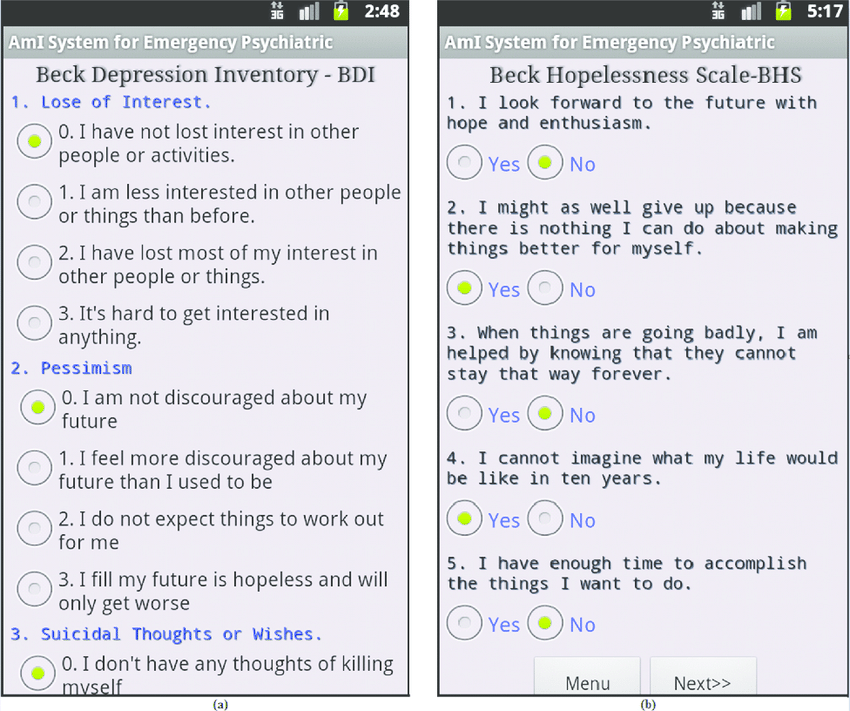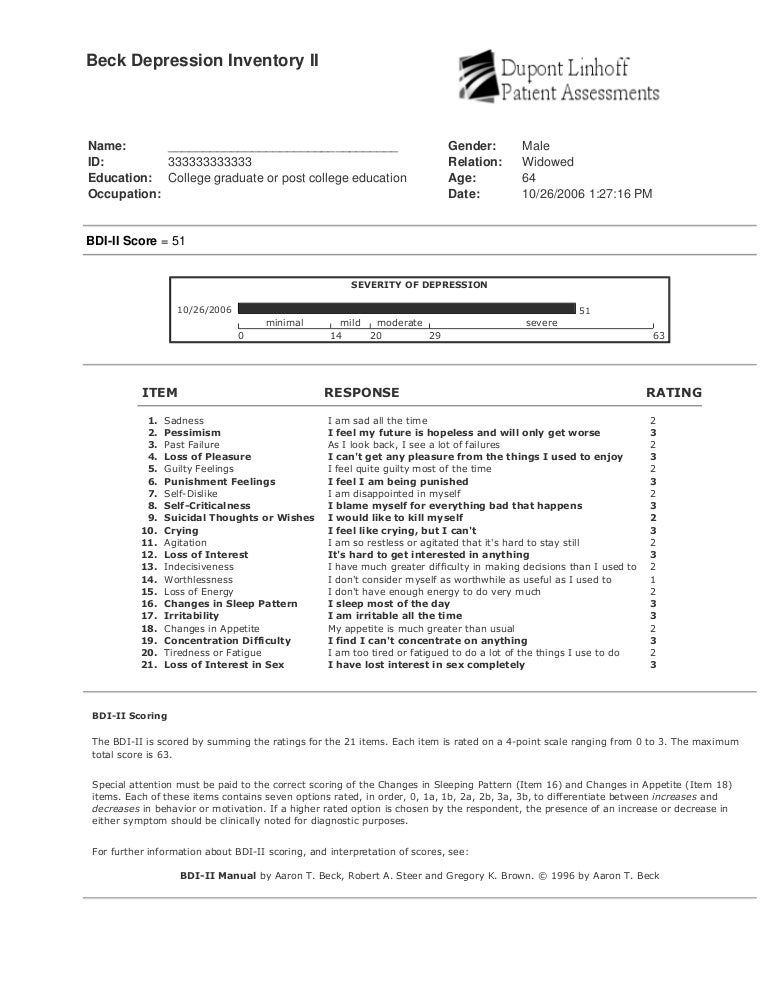
The Beck Hopelessness Scale (BHS) is a questionnaire in which a patient answers 'true' or 'false' to a series of 20 statements that test his or her feelings about the future. The purpose of completing the questionnaire is to determine the likelihood that a particular person will attempt suicide. Since the Beck Hopelessness Scale was first tested and used, it has proved to be a valuable tool with a high level of accuracy when attempting to determine a person's risk of suicide. The scale is a derivation of the Beck Depression Inventory, another test used to determine the level of depression a patient is experiencing.
Patients utilizing the scale respond to a series of 20 statements that are phrased in the first person. The patient classifies each statement as true or false, assessing his or her own feelings. At the end, the responses to the statements are totaled according to a key to find the patient's rank on the Hopelessness Scale; a higher number indicates a higher risk of suicide.
Apr 07, 2013 A scale considered to be predictive of a potential suicide risk, it consists of 20 true-or-false questions which measure pessimism and other negative attitudes. BECK HOPELESSNESS SCALE (BHS): 'The Beck Hopelessness Scale (BHS) is a 20-item, true-or-false test administered by a professional and designed for people no younger than 17.' Beck Hopelessness Scale This is a 20-item scale developed in 1974 by Beck et al. The scale has been described as the most consistent instrument to predict suicide. The response to each item on the scale is either a yes or no. Beck Youth Inventories of Emotional and Social Impairment ® (BYI ®)– Second Edition (For children and adolescents ages 7-18) Beck Anxiety Inventory ® (BAI ®) Beck Depression Inventory ® (BDI ®) Beck Scale for Suicide Ideation ® (BSS ®) Beck Hopelessness Scale ® (BHS ®) Clark-Beck Obsessive-Compulsive Inventory ® (CBOCI ®).

The scale rates the patient’s potential for suicide as one of four possible results. A score of 3 or lower means there is a minimal risk of suicide. A score between 4 and 8 indicates a mild risk. Scores that range from 9 to 14 indicate a moderate chance of suicide, while scores of 15 or higher show a severe risk of suicide. The reliability of the Beck Hopelessness Scale is very high and has been shown to be a very good assessment of risk.
More than half the assessment statements on the Beck Hopelessness Scale were adapted from statements actually made by psychiatric patients who were diagnosed as being in a depressed and hopeless frame of mind. The remaining questions on the test were constructed as being neutral statements relating to hopeless attitudes about the future. Through peer review, the statements were carefully scrutinized and reworded to be as clear and neutral as possible.
The Beck Hopelessness Scale was tested extensively on groups of patients who were in high-risk groups. It also was later tested on groups that were substance abusers, excluding alcoholics. The questionnaire was shown to be highly accurate when administered to high-risk patients and drug users who were adults. The validity of the test is unknown for children and is slightly less accurate when given to patients who are not in a group that is at a high risk for suicide.
Unbeatable assessment tools to help patients heal.
The Beck Hopelessness Scale is a measurement tool that aims to assess three major aspects of hopelessness, with the goal of better understanding how to treat hopelessness, depression, and suicidal behavior. INTERPRETING THE BECK DEPRESSION INVENTORY (BDI-II) Add up the score for each of the 21 questions by counting the number to the right of each question you marked. The highest possible total for the whole test would be sixty-three and the lowest possible score for the test would be zero. This would mean you circles zero on each question.
Beck Hopelessness Scale Questionnaire


The Beck patient assessment tools help healthcare professionals measure patient needs and progress. Their specific applications range from assessing anxiety to youth emotions, and all are available for purchase using the links below.
The Beck Scales for adults and children listed below are not available from Beck Institute, but may be ordered, along with scoring and normative data, from Pearson Assessment, Inc., at 1-800-211-8378 or pearsonassessments.com.